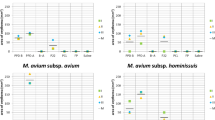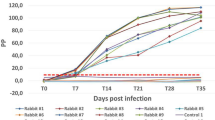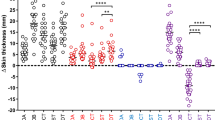Abstract
ECTROMELIA, or ‘mouse pox’, is a highly infectious virus disease of mice which can be present as a subclinical enzootic or a clinically apparent epizootic condition. As a result of importation of infected mice, an outbreak of this disease occurred in research establishments in the London area during late 1973 and the early part of 1974. These mice showed immunological evidence of infection without overt signs of disease, and those in contact were affected by the acute form of the infection. Detection of the infection is usually effected by one of three methods: inoculation of suspect material on to the choriollantoic membrane of 10-d-old chick embryos, in which typical pocks lesions are produced 3 d later if virus is present; serologically, using haemagglutination test1; using the tail scarification test with vaccinia virus, a closely related pox virus, as inoculum.
This is a preview of subscription content, access via your institution
Access options
Subscribe to this journal
Receive 51 print issues and online access
$199.00 per year
only $3.90 per issue
Buy this article
- Purchase on Springer Link
- Instant access to full article PDF
Prices may be subject to local taxes which are calculated during checkout
Similar content being viewed by others
References
Briody, B. A., Bact. Rev., 23, 61–95 (1959).
Author information
Authors and Affiliations
Rights and permissions
About this article
Cite this article
OWEN, D., HILL, A. & ARGENT, S. Reaction of mouse strains to skin test for ectromelia using an allied virus as inoculum. Nature 254, 598–599 (1975). https://doi.org/10.1038/254598a0
Received:
Revised:
Published:
Issue Date:
DOI: https://doi.org/10.1038/254598a0
Comments
By submitting a comment you agree to abide by our Terms and Community Guidelines. If you find something abusive or that does not comply with our terms or guidelines please flag it as inappropriate.



